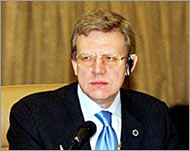Russia’s trouble with the rouble
Millions of Russians face a dilemma over the country’s economic boom – whether to stick to dollars and accept a pay cut or risk being paid in roubles which fluctuate wildly.

Russians, estimated to hold about $35 billion in cash, find it hard to break the faith in the US currency they developed in the turbulent years after the collapse of the Soviet Union, even though there is less and less evidence to support it.
“Every time there is a discussion about paying us in roubles I grow cautious,” says Mikhail Lukin, a 35-year-old manager at a Moscow publishing house.
The issue has begun to take on patriotic overtones with parliament this week giving initial approval to a draft law that would punish government ministers for saying “dollar” when they could have used the word “rouble”.
Rouble revival
Many Russian and foreign firms pay staff in dollars, a tradition dating back to the hyperinflation of the early 1990s.
The dollar’s role as a safe haven strengthened after the financial crisis of 1998 sent the rouble down from 6.4 to 20.8 to the dollar in less than three weeks.
|
“I was taught a lesson during the 90s – I know that if I get my salary in roubles they will immediately fall and I will lose” Mikhail Lukin, publishing house manager |
The dollar reached a peak in December 2002 when it traded at 31.86 roubles, but has been on the retreat since money from oil has fuelled a rouble revival.
The Russian central bank bought up close to $20 billion in April to help to contain the rouble which, since January, has risen 6.5% against the internationally weaker dollar.
Dollar wage earners like Lukin have lost almost 18% of their salaries’ value since that 2002 peak, while rouble prices spiralled by nearly 40% over the same time.
To make things worse, many of Russia‘s ubiquitous currency exchange kiosks have taken advantage of the market mood by offering dollar rates well below the official central bank rate.
President Vladimir Putin’s pledge this month to remove all currency controls by July 1 is expected to put upward pressure on the rouble.
Still, many dollar wage earners remain reluctant to switch to roubles, and one recruitment manager at a Russian company said he warns job seekers of the dangers of having rouble-based salaries.
“I was taught a lesson during the 90s. I know that if I get my salary in roubles they will immediately fall and I will lose,” Lukin said.
Little success
Officially, Russian companies are banned from paying employees in any currency other than roubles, but many companies use schemes to get around the rule.
 |
|
Kudrin has urged Russians to |
“In many cases people still prefer to receive dollar-based salaries. Although statistics show that they are worse off, they still believe in the dollar in the medium to long term,” said Catherine Stalker, partner at PricewaterhouseCoopers.
Stalker said human resources consultants see little pressure from dollar-paid employees on their managers to switch salaries to roubles, but said companies offer big pay increases and incentives to hang on to top talent in Russia’s tight job market.
Alexei Kudrin, the finance minister, has repeatedly called on compatriots to switch to roubles but with little success.
“I personally prefer tying my salary to the price of a barrel of oil,” he says.
“But I doubt my management would agree.”